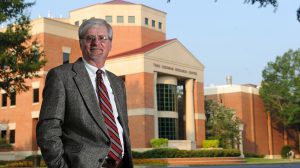
Larry Walker retires this month as director of the UM National Center for Natural Products Research after 35 years of service. Photo by Kevin Bain/Ole Miss Communications
OXFORD, Miss. – On Dec. 31, Larry Walker retires as director of the National Center for Natural Products Research after 35 years of service to the University of Mississippi.
Walker began his career at Ole Miss in 1981 as a research assistant professor in the School of Pharmacy. In 1987, he led a natural products discovery biological screening program, setting him up to be involved with the creation of the natural products center.
When the NCNPR was founded in 1995, Alice Clark, the center’s first director, asked Walker to take on some interim administration duties as the associate director. In 2001, Clark became the university’s vice chancellor for research and sponsored programs, and Walker became the center’s director, a position he has held for 15 years.
“Through distinguished research, visionary leadership, selfless service and strategic international relationships, Dr. Walker has shaped the culture and success of the NCNPR, the School of Pharmacy, our university and our community,” Clark said. “He leaves a legacy of achievement that will serve as the foundation for future success.”
During Walker’s time as director, the NCNPR, which is housed in the School of Pharmacy, made countless scientific discoveries and breakthroughs. He helped to create a repository of natural products and developed a number of high-throughput screens for natural products discovery.
“The drug discovery operation was probably one of the highest impact developments for our program,” Walker said. “We had a vision to create a program where we could collect natural products from all over the world, and then use the high-throughput screening to learn what was in there that might account for the activity.
“That was an exciting vision, even though today it’s a routine part of our work. At that time, it was an ambitious and expensive new enterprise.”
Walker also was instrumental in establishing and sustaining thriving partnerships between the NCNPR and the FDA and USDA. Some of these collaborations yield new pharmaceuticals, agrochemicals and alternative crops for small farmers, while others provide valuable information about the makeup of commercially available supplements and medicines.
He also was involved heavily in the design, planning and outfitting of what became the Thad Cochran Research Center.
Although the NCNPR has grown into an international leader in natural products research, Walker knows there is work to be done.
“My greatest hope for the center is that we develop a broader interface with the private sector, and that eventually we’ll have a robust cluster of natural products-related industries in Mississippi,” Walker said. “We already have several small companies that have started and been very successful, but I think we could expand that greatly.”
Walker’s leadership of the NCNPR has “had an immeasurable impact not only on the school, but on the future of natural products,” said David D. Allen, UM pharmacy dean.
“The natural products center is successful not only because of his research and his leadership, but because of his unending compassion,” Allen said. “He is an incredible administrator, an excellent scientist and a wonderful friend.”
Walker says he will miss his colleagues and the center’s environment of collaboration and discovery.
“Back when I was doing more lab work day-to-day, very rarely would a week go by that you didn’t have something that was new or interesting,” Walker said. “It was really exciting to find that a plant makes a certain compound or impacts a cancer cell. Just to see something new like that every week and to think about how to use that to develop new drugs or generate new research ideas or utilize the expertise of a new collaborator – I’ll miss that.
“And I’ll miss the people, no doubt. Our group has a sense of family. If we have a success, it’s all of us that contribute to it. I think that’s very hard to find in a lot of our workplaces.”
Having lived in Oxford since 1981, Walker said his career has been all the more rewarding for having been spent at UM.
“I don’t think many people in my line of work get to spend their lives, their research careers in such a great setting as Oxford and Ole Miss,” Walker said. “It’s a small town with a lot of culture, a lot of history, a great place for family life, a great place for academic inquiry. To have had the privilege of working in a place like that all my life, it’s been a blessing.”
The School of Pharmacy celebrated Walker’s career with a retirement reception earlier this month.
Ikhlas Khan, the center’s associate director, will become director on Jan. 1, 2017.
Walker also will retire as associate director for research at the Cancer Institute in Jackson, where he has served for six years. He plans to spend more time with his wife, his five children and 13 grandchildren.